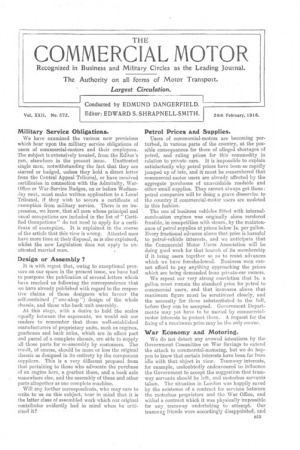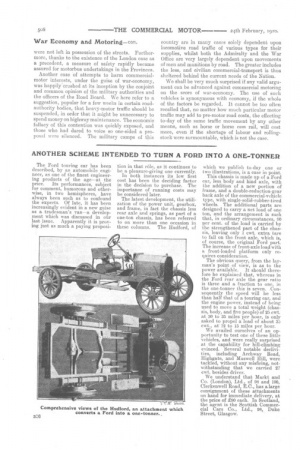Conducted by EDMUND DANGERFIELD.
Page 1

Page 2

If you've noticed an error in this article please click here to report it so we can fix it.
Vol. XXII. No. 572. Editor: EDWARD S. SHRAPNELL-SMITH, 24th February. 1916.
Military Service Obligations.
We have examined the various new provisions which bear upon the military service obligations of users of commercial-motors and their employees. The subject is extensively treated, from the Editor's pen, elsewhere in the present issue. Unattested single men, notwithstanding the fact that they are starred or badged, unless they hold a direct letter from the Central Appeal Tribunal, or have received certificates in connection with the Admiralty, WarOffice or War-Service Badges, on or before Wednesday next, must make written application to a Local Tribunal, if they wish to secure a certificate of exemption from military service. There is an impression, we know, that all men whose principal and usual occupations are included in the list of "Certified Occupations" do not need to apply for a certificate of exemption. It is explained in the course of the article that this view is wrong. Attested men have more time at their disposal, as is also explained, whilst the new Legislation does not apply to unattested married men.
Design or Assembly ?
It is with regret that, owing to exceptional pressure on our space in the present issue, we have had to postpone the publication of several letters which have reached us following the correspondence that we have already published with regard to the respectiveclaims of those designers who favour the self-contained (" one-shop ") design of the whole chassis, and those who back unit assembly.
At this stage, with a desire to hold the scales equally between the exponents, we would ask our readers to remember that those well-established manufacturers of proprietary units, such as engines, gearboxes and back axles, which are in effect part and parcel of a complete chassis, are able to supply all those parts for re-assembly by customers. The result, of course, should be more or less the original chassis as designed in its entirety by the component suppliers. This is a very different proposal from that pertaining to those who advocate the purchase of an engine here, a gearbox there, and a back axle somewhere else, and the assembly of these and other parts altogether as one complete machine.
Will any further correspondents, who may care to write to us on this subject, bear in mind that it is the latter class of assembled work which our original contributor evidently had in mind when he criticised it ?
Petrol Prices and Supplies.
Users of commercial-motors are becoming perturbed, in various parts of the country, at the possible consequences for them of alleged shortages of petrol, and ruling prices for this commodity in relation to private cars. It is impossible to explain satisfactorily why petrol prices have been so rapidly jumped up of late, and. it must be remembered that commercial-motor users are already affected by the aggregate purchases of unavoidable roadside and other small supplies. They cannot always get these: petrol companies will be doing a grave disservice to the country if commercial-motor users are mulcted in This faShion.
" The use -of business vehicles fitted with internalconibustion engines was originally alone rendered feasible, in competition with steam, by the maintenance of petrol supplies at prices below is. per gallon. Every fractional advance above that price is harmful to petrol-vehicle interests, and we anticipate that the Commercial Motor Users Association will be doing good work for that branch of its membership if it bring users together so as to resist advances which we have foreshadowed. Business men cannot afford to pay anything approaching the prices which are being demanded from private-car owners.
We repeat our very strong conviction that 1s. a gallon must remain the standard price for petrol to commercial users, and that increases above that maximum figure must be scrutinized closely, and the necessity for them substantiated to the full, before they can be accepted. Government Departments may yet have to be moved by commercialmotor interests to protect them. A request for the fixing of a maximum price may be the only course.
War Economy and Motoring.
We do not detect any avowed intentions by the Government Committee OD War Savings to extend the attack to commercial-motoring, but we do happen to know that certain interests have been far from idle with that object in view. Tramway interests, for example, undoubtedly endeavoured to influence the Government to accept the suggestion that tramway servants should be left, and motorbus servants taken. The situation in London was happily saved by the existence of a contract for services between the motorbus proprietors and the War Office, and withal a contract which it was physically impossible for any .tramway undertaking to attempt. Our tramway, friends were accordingly disapp-iiinted, and were not left in possession of the streets. Furthermore, thanks to the existence of the London case as a precedent, a measure of safety rapidly became assured for motorbus undertakings in the Provinces.
Another case of attempts to harm commercialmotor interests, under the guise of war-economy, was happily'crushed at its inception by the conjoint and common opinion of the military authorities and the officers of the Road Board. We here refer to a suggestion, popular for a few weeks in certain roadauthority bodies, that heavy-motor traffic should be suspended, in order that it might be unnecessary to spend money on highway maintenance. The economic fallacy of this contention was quickly exposed, and those who had dared to voice so one-sided a proposal were silenced. The military camps of this country are in many cases soleIY dependent upon locomotive road traffic of various types for their supplies, whilst both the Admiralty and the War Office are very largely dependent upon movements of men and munitions by road. The greater includes the less, and civilian commercial-transport is thus sheltered behind the current needs of the Nation.
We shall be very much surprised if any valid argument can be advanced against commercial motoring on the score of war-economy. The use of such vehicles is synonymous with economy, if the whole of the factors be regarded. It cannot be too often recalled that, no matter how much particular motor traffic may add to pre-motor road costs, the effecting to-day of the same traffic movement by any other means, such as horse or horse cum rail, will cost more, even if the shortage of labour and rollingstock were surmountable, which is not the case.




















